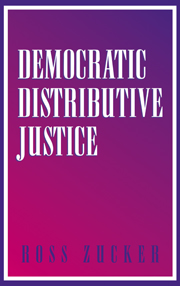Book contents
- Frontmatter
- Contents
- Acknowledgments
- 1 Democracy and Economic Justice
- Part I Unequal Property and Individualism in Liberal Theory
- Part II Egalitarian Property and Justice as Dueness
- Part III Egalitarian Property and the Ethics of Economic Community
- 8 Deriving Equality from Community
- 9 The Dimension of Community in Capital-Based Market Systems: Between Consumers and Producers
- 10 Endogenous Preferences and Economic Community
- 11 The Dimension of Community in Capital-Based Market Systems: Between Capital and Labor
- 12 The Right to an Equal Share of Part of National Income
- Part IV Democracy and Economic Justice
- Conclusions
- References
- Index
8 - Deriving Equality from Community
Published online by Cambridge University Press: 02 December 2009
- Frontmatter
- Contents
- Acknowledgments
- 1 Democracy and Economic Justice
- Part I Unequal Property and Individualism in Liberal Theory
- Part II Egalitarian Property and Justice as Dueness
- Part III Egalitarian Property and the Ethics of Economic Community
- 8 Deriving Equality from Community
- 9 The Dimension of Community in Capital-Based Market Systems: Between Consumers and Producers
- 10 Endogenous Preferences and Economic Community
- 11 The Dimension of Community in Capital-Based Market Systems: Between Capital and Labor
- 12 The Right to an Equal Share of Part of National Income
- Part IV Democracy and Economic Justice
- Conclusions
- References
- Index
Summary
The ethics of economic community entitle members to equal portions of a part of national income. The argument from community in Part III supplements the derivation of the same redistributory property right in Chapters 5 and 6, where it is derived from the ethics of dueness for economic contributions. The ethics of economic community show that membership in an economic community entitles individuals to a right to equal portions of a part of national income because they are members of a community, whereas the ethics of dueness derive this right from a class of equal economic contributions. By supplementing the derivation provided by the ethics of contributions, the ethics of economic community provide additional ethical validation for the redistributory property right.
A principle of equal distribution is morally warranted by membership in a community, to the extent that the society consists in a community (see Chapter 8). This principle can be applied to the real world because, underlying the moral derivation of equality from community, there exists an actual dimension of community that runs throughout capital-based market systems (see Chapters 9–11). While community does not characterize every aspect of economic life – many activities are not communal but competitive and relatively independent – it is not limited to the subsystemic level, but exists systemwide. The dimension of community obtains between producers and consumers (see Chapters 9 and 10) and, moveover, between laborers and capital owners and capital managers (see Chapter 11).
The extent of this community justifies the equal distribution of proportionate income in capital-based market systems (see Chapter 12).
- Type
- Chapter
- Information
- Democratic Distributive Justice , pp. 153 - 168Publisher: Cambridge University PressPrint publication year: 2000



